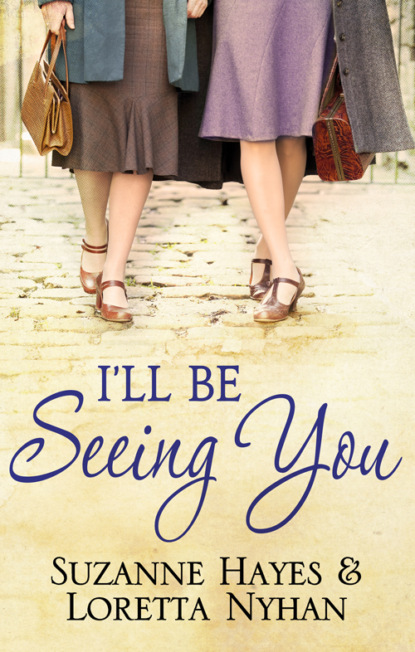По всем вопросам обращайтесь на: info@litportal.ru
(©) 2003-2024.
✖
I'll Be Seeing You
Автор
Год написания книги
2018
Настройки чтения
Размер шрифта
Высота строк
Поля
I wanted to tell him. To confess. And I opened my mouth fully prepared to tell the truth, but instead I used your words.
“Rita tells me that the boys left behind are broken, somehow. I suppose he feels like he’s not doing his patriotic duty.”
Robert scratched his head, and Corrine gave him kisses on his cheek. One kiss, laughter, another kiss, more laughter. How she loves her daddy.
“He IS doing an honorable thing, though. Don’t you think, Glory?”
“What’s that?”
“He’s helping me fight with the peace of knowing you and the kids are in good hands.”
Oh, Rita. What have I done? And why, when Levi left without a word to me, did I want to cry?
Soon Robert will ship out overseas. Soon the garden will be covered in frost. And soon I’ll be strong enough to leave Corrine with Marie and spend my days at the hospital with Robbie. He’s frightened of the dark and those nurses are always switching off the lights. It makes me want to clobber them. Knock their crisp white hats off their tidy pinned hair.
I’ve missed your stories. Write soon.
Love, and many thanks for sharing some sorely needed sense,
Glory
P.S. You know the best thing about Robert being home? The little things... Coffee in the morning, hearing him sing in the shower, the way his skin always smells like soap. I know this sounds treasonous, but I wish we could all run away to Switzerland.
September 12, 1943
IOWA CITY, IOWA
Dearest Glory,
Please stop thinking your actions had anything to do with Robbie’s illness.
There is nothing more unavoidable or more damaging as a mother’s guilt. This I know perhaps better than most, though I was never meant to be a mother.
Back in grammar school, I fell from a tire swing and landed hard, fracturing some necessary bones in my small pelvis. I can barely remember the pain, but I can clearly recall the doctor telling my father, in hushed tones over my sickbed, that I was ruined.
I’d never heard my father cry before, but he did, either for me or the grandsons he surely thought would someday come. My mother soothed him, saying, “Wait and see. Wait and see,” over and over until even I was able to sleep, to dream, to heal.
For months I walked with crutches and drank half a cup of wine before bed to thin my blood. I rested when I could and ate so much cheese I got a little plump. Eventually the bones fused back together and I tossed my crutches into the fire.
We never talked about it. When I first saw spots of blood on my underthings Mother hugged me tight and said it was God’s sign I could have a baby. Even at thirteen I knew she was simply wishing for it to be true. Still, I decided I would take her word.
I never told Sal. It shames me to write this. We married, moved into his parents’ building on Chicago’s west side and tried for a baby. Nothing happened. After a year Sal cupped my chin and said, “Maybe it’ll be just you and me, kiddo. And that’s fine in my book.” I cried through the night with Sal holding my face, kissing away each tear.
When I skipped my time, I figured I was coming down with something. A few weeks later Mama Vincenzo caught my eye at Sunday dinner, smiling her cryptic Mona Lisa smile. She pulled me aside after dessert and asked when the bambino was coming.
The realization sent a tremor through my body, head to toe. Mama V held my hand and told me not to worry, assuming my distress came from fear. But it was joy, Glory. Pure delight.
I couldn’t wait for the baby to come. Toward the end I showed up at the hospital where Sal worked every time I got a twinge. The nurses started teasing Sal about it, calling him “Mr. False Alarm,” which is why I waited so long when I finally did go into labor.
Mrs. Vincenzo delivered Toby on our kitchen table. “It will be quick,” she said. “Ten minutes.” And it was. By most standards I had an easy birth. But my pelvic bones—the ones my mother lovingly guided to health so many years before—cracked along those old fault lines.
The pain...it was like a couple of wild dogs tearing at each hip. Mrs. Vincenzo put the baby to my bosom, but I could only stare at a crack in the wall, a fixed point to hypnotize myself into oblivion. Sal whispered loving words in my ear, telling me how beautiful I was and how perfect the baby looked, but I could barely breathe, let alone talk.
Mrs. Vincenzo said I just needed rest, and Sal agreed with her until three days passed and I still could not get out of bed.
He sent word to a doctor friend at Cook County, who showed up after his shift. I blacked out during the exam. When I came to, Sal knelt at my bed, saying over and over, “What’s wrong with us that we didn’t notice?” He never once said, “What’s wrong with you that you didn’t say anything?”
I withdrew from everyone, even Toby. Mrs. Vincenzo said all women had “the darkness” after childbirth, to varying degrees, and since I’d broken my bones I needed extra time. But my darkness came from guilt—I felt like all the things I’d kept from Sal had weakened my insides, each lie causing a small fracture. All my goodness came out with the baby, and my body, with nothing to stabilize it, shattered.
Вы ознакомились с фрагментом книги.
Приобретайте полный текст книги у нашего партнера:
Приобретайте полный текст книги у нашего партнера:





